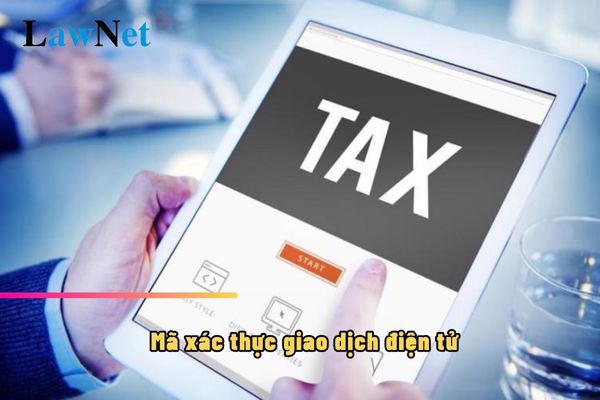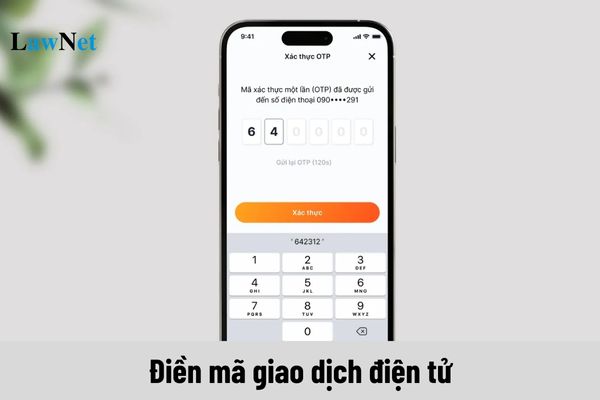What is an e-transaction code in Vietnam?
What is an e-transaction code in Vietnam?
Pursuant to clause 5, Article 3 of Circular 19/2021/TT-BTC, the definition of an e-transaction code is as follows:
Explanation of terms
In this Circular, the following terms are understood as follows:
...
5. “e-transaction code” is a one-time password used when the taxpayer does not have a digital certificate to perform an electronic transaction. This password is sent from the electronic portal of the General Department of Taxation or the systems of relevant agencies to the taxpayer's registered phone number or email address with the tax authorities, or is randomly generated every minute by an automatic electronic device provided by the tax authorities or relevant agencies, or randomly generated after a certain period by the application of the tax authorities or relevant agencies and installed on smartphones, tablets.
...
Thus, simply understood, the e-transaction code is a one-time password used when the taxpayer does not have a digital certificate to perform an electronic transaction.

What is an e-transaction code in Vietnam? (Image from the Internet)
How does a person with a tax code but without a digital certificate register to receive an e-transaction code in Vietnam?
Pursuant to clause 2, Article 7 of Circular 19/2021/TT-BTC, the following regulations apply:
Electronic signature in electronic tax transactions
1. Taxpayers conducting electronic tax transactions must use a valid digital certificate issued by a public certification service provider, the competent state authority, or recognized by the competent state authority on tax documents and electronic tax certificates except in the following cases:
a) The taxpayer is an individual with a tax code but without a digital certificate.
b) The taxpayer is performing the initial taxpayer registration and acquiring a tax code under clause 1, Article 13 of this Circular.
c) The taxpayer chooses to pay taxes electronically following the regulations at point đ clause 2, Article 4 of this Circular, as prescribed by the bank or the intermediary payment service provider.
2. Register for the use of digital certificates and mobile phone numbers to conduct e-transactions in the tax field
a) Taxpayers can register one or multiple digital certificates to perform electronic tax transactions and use multiple digital certificates for one tax administrative procedure.
b) Before using a digital certificate to conduct electronic tax transactions, the taxpayer must register the digital certificate with the tax authorities.
c) Individuals specified at point a of clause 1 of this article can register a single mobile phone number to receive an e-transaction code via “SMS” for each electronic transaction with the tax authorities.
d) For taxpayers specified at point b of clause 1 of this article, a single mobile phone number of the individual or the individual who is the legal representative of the organization can be registered to receive an e-transaction code via “SMS” when submitting the initial electronic taxpayer registration documents to the tax authorities.
...
Thus, according to the above regulations, individuals with a tax code but without a digital certificate should use a single mobile phone number to register to receive e-transaction codes via SMS.
This e-transaction code will be sent via SMS for each electronic transaction with the tax authorities.
Can an individual with a tax code but without a digital certificate use Smart OTP to authenticate e-transactions in Vietnam?
Pursuant to clause 4, Article 7 of Circular 19/2021/TT-BTC, the following regulations apply:
Electronic signature in electronic tax transactions
...
4. Use of digital signatures and electronic transaction authentication for taxpayers:
a) Taxpayers must use digital signatures with digital certificates specified in clause 1 and points a and b of clause 2 of this article to sign electronic documents when conducting transactions with tax authorities electronically.
b) Taxpayers who sign a service contract with a tax agent to handle tax procedures will have the tax agent use their digital certificate to sign the taxpayer’s electronic documents when conducting transactions electronically with the tax authorities.
c) Taxpayers who are individuals conducting electronic tax transactions with the tax authorities but without a digital certificate may:
c.1) Use the e-transaction code sent by the electronic portal of the General Department of Taxation or systems of relevant agencies via “SMS” to the registered phone number, or to the email address registered with the tax authorities or relevant agencies to the electronic transaction (hereinafter referred to as SMS OTP);
c.2) Use the e-transaction code generated randomly every minute by an automatic electronic device provided by the tax authorities or relevant agencies (hereinafter referred to as Token OTP);
c.3) Use the electronically transaction authentication code that is randomly generated after a certain period by the application of the tax authorities or relevant agencies, and installed on smartphones, tablets (hereinafter referred to as Smart OTP);
c.4) Use biometric authentication as per Decree No. 165/2018/ND-CP.
d) Taxpayers who are organizations or individuals filing on behalf of others and paying tax on behalf of organizations, individuals, or foreign contractors must use their own digital certificate to sign electronic documents when conducting transactions with tax authorities electronically.
...
Thus, according to the above regulations, individuals conducting electronic tax transactions with the tax authorities but without a digital certificate will be allowed to use the Smart OTP e-transaction code.
Smart OTP is an e-transaction code that is randomly generated after a period by the tax authorities’ application or relevant agencies, and installed on smartphones, tablets.





- How long is the duration of exemption from licensing fees for a new enterprise in Vietnam? What are cases of licensing fee exemption in Vietnam?
- What are cases where the input VAT must not be deducted in Vietnam? What are the conditions for VAT input deduction?
- What are cases where personal income late payment interest is charged in Vietnam?
- How long can a taxpayer delay submitting tax declaration dossiers before their information is published in Vietnam?
- What is the Form 01/CT-KTT for amendments to the information of tax accounting books in Vietnam?
- When is the deadline for submitting annual financial statements in Vietnam? How much is the penalty for late submission?
- Shall import-export duties be paid in foreign currency in Vietnam?
- What is the excise tax rate for beer in Vietnam in 2024?
- What is coefficient K for monitoring invoicing beyond a safety threshold in Vietnam? What is the formula for calculating coefficient K in Vietnam?
- What are cases where the input VAT must not be deducted in Vietnam?

